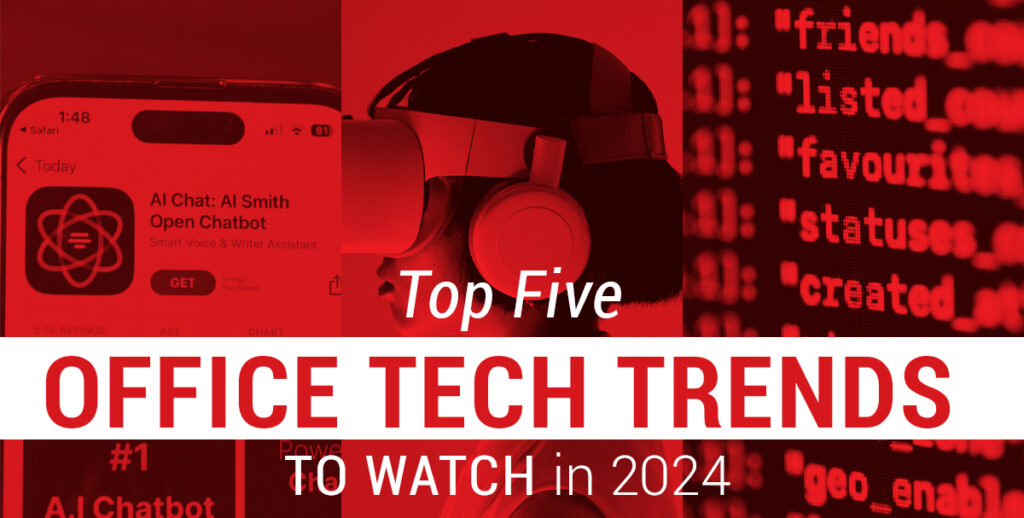
Top 5 Office Technology Trends to Watch in 2024
As businesses navigate the rapidly evolving landscape of office technology, understanding the key trends can provide a significant competitive edge. In 2024, several innovations are set to transform the way we work, enhancing productivity, collaboration, and overall efficiency. This article delves into the top five office technology trends that will shape the business environment in the coming year, offering insights into their potential impact and implementation.
Artificial Intelligence and Automation
Artificial Intelligence (AI) and automation continue to revolutionize office workflows, driving efficiency and productivity to new heights. In 2024, these technologies are expected to become even more integral to daily operations.
AI-Powered Tools
AI-powered tools are increasingly being adopted to streamline tasks such as data entry, customer service, and decision-making processes. For instance, AI-driven chatbots can handle customer inquiries efficiently, freeing up human resources for more complex tasks. Additionally, AI algorithms are enhancing data analytics, providing deeper insights and more accurate predictions that guide business strategies.

Robotic Process Automation (RPA)
Robotic Process Automation (RPA) is another facet of automation that is gaining traction. RPA software bots can mimic human actions to perform repetitive tasks across various applications, significantly reducing errors and operational costs. According to a report by Deloitte, businesses can expect to achieve an average ROI of 30% to 200% within the first year of implementing RPA.
Hybrid Work Solutions
The hybrid work model, which combines remote and in-office work, is solidifying its place as a standard practice. Advances in technology are supporting this transition, making it easier for employees to collaborate and maintain productivity regardless of their location.
Unified Communication Platforms
Unified communication platforms, such as Microsoft Teams and Slack, are essential tools for hybrid work. These platforms integrate various communication channels—video conferencing, instant messaging, and file sharing—into a single interface, ensuring seamless collaboration. Gartner predicts that by 2025, 75% of all meetings will be conducted virtually, underscoring the importance of robust communication tools.
Advanced Remote Access Solutions
Advanced remote access solutions are also crucial. Virtual Private Networks (VPNs) and cloud-based desktop services enable secure access to office networks from anywhere in the world. These technologies ensure that employees can perform their tasks without compromising security, thus maintaining business continuity.


Cybersecurity Enhancements
With the increasing reliance on digital technologies, cybersecurity remains a top priority. In 2024, businesses are expected to invest heavily in advanced security measures to protect their data and systems from cyber threats.
Zero Trust Architecture
Zero Trust Architecture (ZTA) is becoming the gold standard in cybersecurity. Unlike traditional security models that rely on perimeter defenses, ZTA assumes that threats could exist both inside and outside the network. Therefore, it requires strict verification for every user and device attempting to access resources. This approach minimizes the risk of data breaches and ensures comprehensive protection.
AI in Cybersecurity
AI is also playing a pivotal role in enhancing cybersecurity. AI-powered systems can detect and respond to threats in real-time, often before they can cause significant damage. These systems analyze vast amounts of data to identify unusual patterns and potential vulnerabilities, enabling proactive defense measures.
Sustainable Technology Solutions
Sustainability is increasingly becoming a critical consideration in business operations. In 2024, the adoption of green technologies will not only help companies reduce their environmental footprint but also improve their public image and operational efficiency.
Energy-Efficient Devices
Energy-efficient devices, such as laptops, servers, and printers, are designed to consume less power without compromising performance. Companies are also investing in smart office systems that manage lighting, heating, and cooling more efficiently, significantly reducing energy consumption.
Cloud Computing
Cloud computing is another key player in sustainability efforts. By migrating to cloud services, businesses can reduce their reliance on physical servers, which require substantial energy to operate and cool. According to a study by Accenture, cloud solutions can reduce energy consumption by up to 65% compared to traditional data centers.
Augmented Reality (AR) and Virtual Reality (VR)
Augmented Reality (AR) and Virtual Reality (VR) technologies are set to revolutionize training, collaboration, and customer engagement in 2024. These immersive technologies provide innovative ways to enhance the workplace experience.
Training and Development
AR and VR are particularly effective for training and development. These technologies can create realistic simulations that allow employees to practice skills in a controlled, risk-free environment. For example, VR can simulate complex machinery operations or emergency response scenarios, providing hands-on experience without the associated risks.
Enhanced Collaboration
In terms of collaboration, AR and VR enable virtual meetings that feel more like in-person interactions. Virtual meeting rooms and collaborative workspaces allow team members to interact with 3D models and data visualizations, fostering better understanding and more effective decision-making. A study by PwC found that employees in VR-enabled training sessions learn four times faster than in traditional classroom settings.

As we move through 2024, these office technology trends will undoubtedly shape the future of work. By staying informed and adaptable, businesses can leverage these innovations to enhance productivity, security, and sustainability, positioning themselves for success in an increasingly digital world.
Locations: Boise, ID; Twin Falls, ID; Idaho Falls, ID; Pocatello, ID; Coeur d’Alene, ID; Great Falls, MT; Helena, MT; Butte, MT; Bozeman, MT; Billings, MT; Missoula, MT; Spokane, WA; Salt Lake City, UT; St. George, UT.
